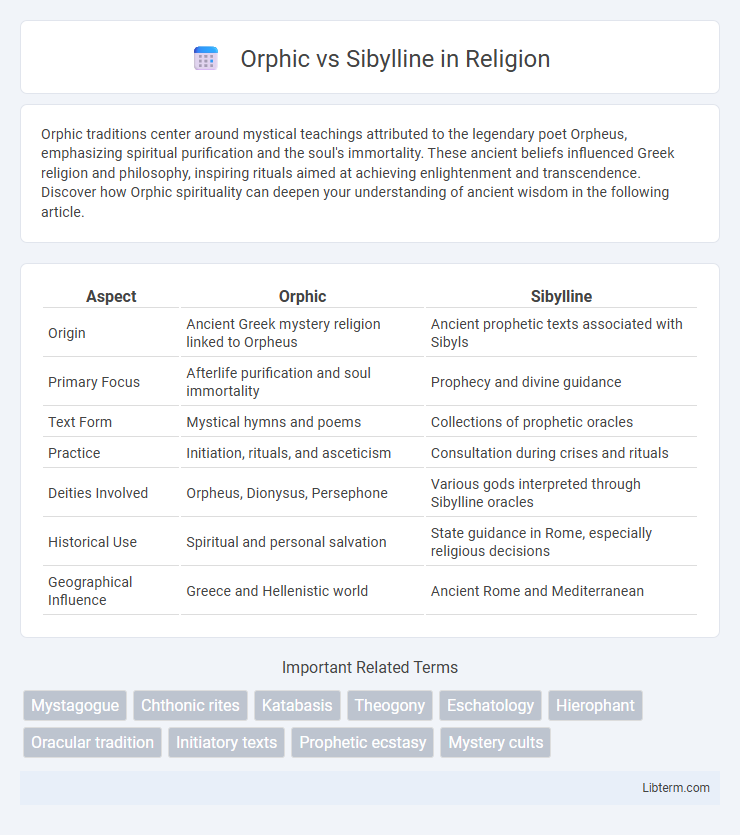Orphic traditions center around mystical teachings attributed to the legendary poet Orpheus, emphasizing spiritual purification and the soul's immortality. These ancient beliefs influenced Greek religion and philosophy, inspiring rituals aimed at achieving enlightenment and transcendence. Discover how Orphic spirituality can deepen your understanding of ancient wisdom in the following article.
Table of Comparison
| Aspect | Orphic | Sibylline |
|---|---|---|
| Origin | Ancient Greek mystery religion linked to Orpheus | Ancient prophetic texts associated with Sibyls |
| Primary Focus | Afterlife purification and soul immortality | Prophecy and divine guidance |
| Text Form | Mystical hymns and poems | Collections of prophetic oracles |
| Practice | Initiation, rituals, and asceticism | Consultation during crises and rituals |
| Deities Involved | Orpheus, Dionysus, Persephone | Various gods interpreted through Sibylline oracles |
| Historical Use | Spiritual and personal salvation | State guidance in Rome, especially religious decisions |
| Geographical Influence | Greece and Hellenistic world | Ancient Rome and Mediterranean |
Introduction to Orphic and Sibylline Traditions
Orphic tradition centers on mystical religious beliefs and practices attributed to Orpheus, emphasizing the soul's purification and afterlife. Sibylline tradition involves prophetic writings and oral oracular poems attributed to the Sibyls, ancient prophetesses providing divine guidance. Both traditions influenced ancient Greek and Roman spirituality by shaping concepts of fate, divinity, and esoteric knowledge.
Historical Origins: Orphism and Sibylline Prophecy
Orphism originated in ancient Greece, centered on the mythic poet Orpheus, and emphasized mystical rites and beliefs related to the soul's immortality and purification. Sibylline prophecy traces back to the sibyls, female prophetesses who were believed to deliver divine messages inspired by the god Apollo, with the Sibylline Books serving as a key collection of oracular texts in ancient Rome. Both traditions influenced religious and cultural practices, with Orphism shaping esoteric spirituality and Sibylline prophecies guiding political and religious decisions in antiquity.
Key Texts: Orphic Hymns vs. Sibylline Books
The Orphic Hymns comprise a collection of 87 ancient Greek religious poems attributed to Orpheus, emphasizing mystical rituals, cosmogony, and divine invocation central to Orphism. The Sibylline Books, traditionally ascribed to the prophetic Sibyls, consist of prophetic and apocalyptic verses that guided Roman religious practices and political decisions during crises. While the Orphic Hymns center on personal spirituality and mythological themes, the Sibylline Books function as state-sponsored oracles integral to public rites and national security.
Central Beliefs and Doctrines
Orphic beliefs center on the soul's purification and its cyclical reincarnation, emphasizing rituals and hymns attributed to Orpheus that guide the soul toward liberation. Sibylline doctrines are rooted in prophetic revelations and divinatory texts, focusing on fate, divine will, and the interpretation of omens for communal guidance. Both traditions address the soul's journey but differ in practices: Orphism stresses asceticism and personal salvation, while Sibylline prophecies emphasize public rituals and oracular pronouncements.
Ritual Practices and Ceremonies
Orphic rituals emphasized personal purification, ascetic practices, and the use of hymns to connect with the divine, often involving the consumption of sacred texts and the promise of a blessed afterlife. Sibylline ceremonies centered around prophetic consultations and sacrifices, with rituals conducted by priestesses or seers to invoke or interpret divine will during critical public events. Both traditions deeply influenced ancient religious practices, with Orphic rites focusing on individual spiritual transformation and Sibylline rites emphasizing communal guidance and divination.
Influence on Greek and Roman Religion
Orphic traditions profoundly influenced Greek religion by introducing concepts of the soul's immortality, purification rites, and an eschatological worldview that differed from mainstream Homeric beliefs. Sibylline texts shaped Roman religion through their prophetic guidance, influencing state rituals, public ceremonies, and decisions during crises by integrating oracular wisdom believed to originate from divine sources. Both Orphic and Sibylline traditions contributed to the evolving religious landscapes by merging mysticism and prophecy with established mythologies and cult practices in ancient Greece and Rome.
Comparative Mythology: Gods and Figures
Orphic traditions center around Orpheus, a legendary poet and prophet who bridges the divine and mortal realms, emphasizing themes of rebirth and cosmic order through his connection to Dionysus and the Afterlife. Sibylline lore, linked to the Sibyls--mystical prophetesses--focuses on apocalyptic visions and divine revelations from Apollo, offering guidance through cryptic prophecies related to fate and the gods' will. Comparative mythology highlights Orphic texts as esoteric and initiatory, while Sibylline books serve as prophetic oracles influencing Roman religious and political decisions.
Reception in Later Philosophical Thought
Orphic and Sibylline texts influenced later philosophical traditions by shaping metaphysical and eschatological concepts in Neoplatonism and early Christian thought. Orphic literature contributed to ideas about the soul's immortality and the cycle of reincarnation, while Sibylline prophecies informed apocalyptic and messianic expectations in Roman and early medieval philosophy. Both bodies of work were revered as authoritative sources for divine knowledge and moral guidance, impacting the reception of mystical and prophetic themes in Western intellectual history.
Legacy in Western Mysticism
Orphic traditions profoundly shaped Western mysticism through their focus on the soul's immortality and ritual purity, influencing Pythagoreanism and later Neoplatonism. Sibylline prophecies contributed to Western esoteric thought by blending divine revelation with apocalyptic visions, impacting early Christian mysticism and Renaissance occultism. Together, Orphic and Sibylline legacies enriched Western spiritual frameworks by merging mythic, prophetic, and philosophical elements into enduring mystical practices.
Modern Interpretations and Scholarship
Modern interpretations of Orphic and Sibylline texts emphasize their distinct roles in shaping ancient religious and philosophical thought, with Orphic traditions highlighting esoteric spirituality and afterlife beliefs, while Sibylline prophecies are regarded as foundational to Roman religious practices and state rituals. Contemporary scholarship employs interdisciplinary methods, including philological analysis and comparative mythology, to reassess the origins, transmission, and cultural impact of these texts, revealing their adaptive significance across historical contexts. Research increasingly recognizes the influence of Orphic mysticism on early Christian theology and the Sibylline oracles' role in legitimizing imperial authority in antiquity.
Orphic Infographic

 libterm.com
libterm.com